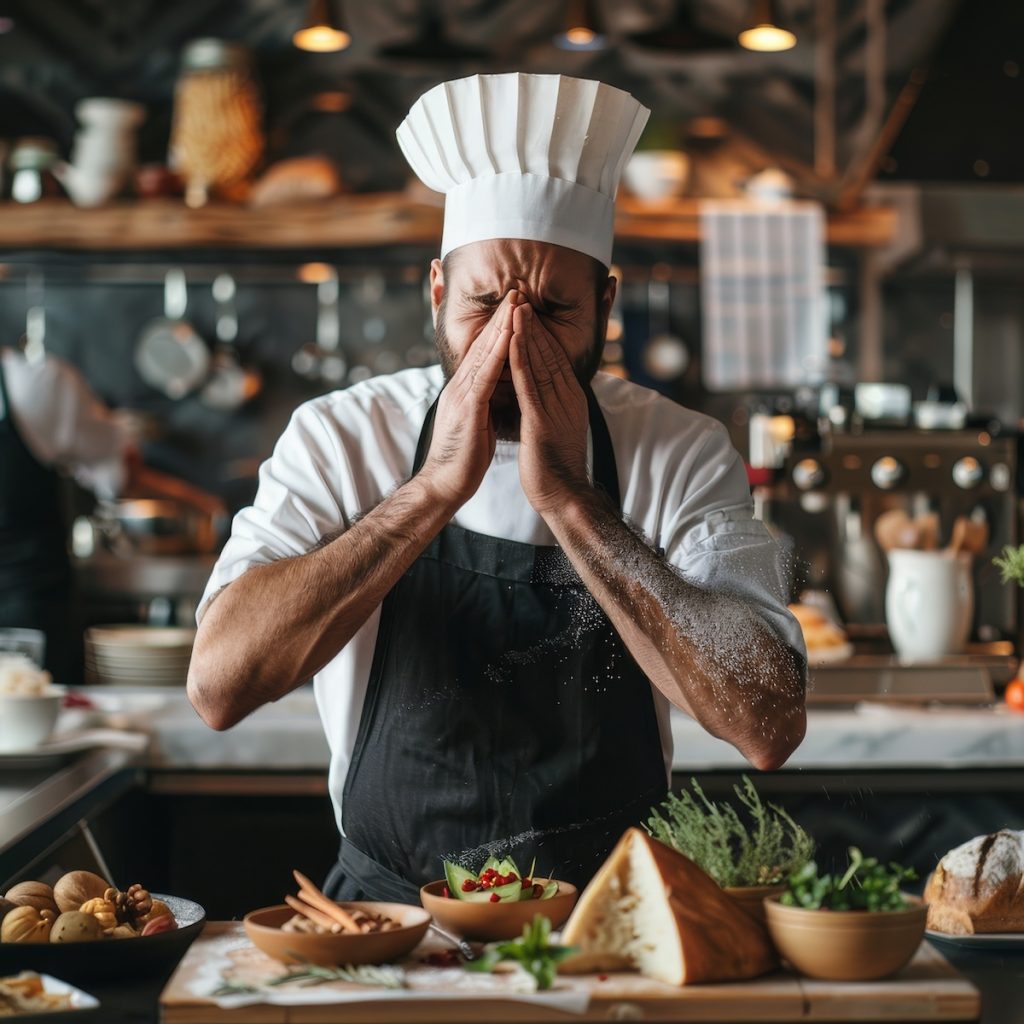Can You Become a Professional Cook with Food Allergies?
In the high-stakes world of professional cooking, dealing with food allergies adds an extra layer of complexity. For many cooks, the kitchen is a place of creativity and passion, where flavors are crafted and dishes come to life.
However, for those with food allergies, it also becomes a battleground where safety and innovation must coexist. Balancing these challenges demands exceptional skill, meticulous attention to detail, and unwavering dedication.
Professional cooks with food allergies navigate their culinary careers with unique obstacles. Whether it’s a severe nut allergy, gluten intolerance, or shellfish sensitivity, these culinary artists must constantly be vigilant, ensuring that their work environment remains safe. This involves stringent protocols for ingredient sourcing, rigorous cleaning routines to prevent cross-contamination, and the use of alternative ingredients to maintain the integrity and flavor of their dishes.
Despite these challenges, many cooks with food allergies excel in their field, turning potential limitations into sources of inspiration. They bring heightened awareness to their craft, advocating for safer kitchen practices and inclusive menus that accommodate diverse dietary needs.
Their stories are about overcoming personal hurdles and making the culinary world more inclusive and aware of food allergy issues. Through their resilience and creativity, these cooks prove that dietary restrictions can lead to new culinary heights and greater innovation in the kitchen.
What Can a Professional Cook Do?
A professional chef can take several proactive measures to deal with food allergies, ensuring both personal safety and the safety of their diners. Here are some key strategies:
Personal Safety
- Know Your Allergies: Understand the specific allergens and the severity of reactions. Keep epinephrine auto-injectors and other necessary medications on hand at all times.
- Ingredient Awareness: Always read labels and be aware of hidden allergens in ingredients. Communicate clearly with suppliers about allergy concerns.
- Substitute Ingredients: Develop expertise in using safe alternatives for allergenic ingredients to maintain the quality and flavor of dishes.
Kitchen Practices
- Prevent Cross-Contamination: Implement strict protocols for cleaning surfaces, utensils, and equipment. Use separate cutting boards, knives, and cooking utensils for allergen-free preparations.
- Label Clearly: Label all ingredients, spices, and prepared foods to avoid accidental cross-contact.
- Allergy Zones: Designate specific areas in the kitchen for handling allergen-free foods to minimize the risk of contamination.
Customer Safety
- Menu Transparency: Indicate potential allergens in menu items and provide detailed ingredient lists. Offer allergen-free options.
- Staff Training: Train all kitchen and service staff about food allergies, cross-contamination risks, and emergency procedures.
- Communication: Encourage open communication with diners about their allergies. Have a system for noting and remembering regular customers’ dietary needs.
Continuous Education
- Stay Informed: Keep up-to-date with the latest research and developments in food allergies and safety practices.
- Network: Connect with other chefs and industry professionals to share knowledge and strategies for managing food allergies.
By incorporating these practices, a professional chef can create a safer dining environment, cater to a broader audience, and demonstrate a commitment to inclusivity and excellence in culinary endeavors.
What About Safety?
Whether it is safe for a professional cook with food allergies to be around food depends on the severity of their allergies and the specific circumstances. Here are some considerations:
Mild Allergies
For cooks with mild allergies, being around food may generally be safe if they take appropriate precautions. This might include avoiding direct contact with allergens and ensuring they do not ingest any trace amounts.
Severe Allergies
For cooks with severe allergies, especially those with anaphylactic reactions, being around food can pose significant risks. However, they can still work safely with stringent measures in place:
- Strict Hygiene Protocols: Implement rigorous cleaning and sanitation procedures to prevent cross-contamination.
- Personal Protective Equipment (PPE): Use gloves, masks, and other protective gear when handling allergenic ingredients.
- Separate Work Areas: Designate specific areas in the kitchen for allergen handling to minimize exposure.
- Avoid Direct Contact: Delegate tasks involving allergenic foods to other staff members.
- Emergency Preparedness: Keep epinephrine auto-injectors and other necessary medications readily available and ensure all staff are trained to use them.
Precautionary Measures
- Regular Health Monitoring: Monitor their health for any signs of allergic reactions and take immediate action if symptoms arise.
- Clear Communication: Maintain open communication with colleagues about their allergies and ensure everyone knows about emergency procedures.
- Ongoing Education: Stay informed about new allergy management and food safety developments.
By taking these precautions, professional cooks with food allergies can minimize their risk, continue to thrive in their culinary careers, and ensure a safe working environment for themselves and their colleagues.
















2 Responses
The article i just read about going to culinary school while having food allergies was very encouraging… I’m in the New York, New Jersey area. Do you know of any schools that i can attend with my allergies?
-Junior
Junior, I have some schools listed on my site but their are others, smaller community colleges you can try. You will have to contact the schools directly to see what their allergy policies are. Good luck with school.